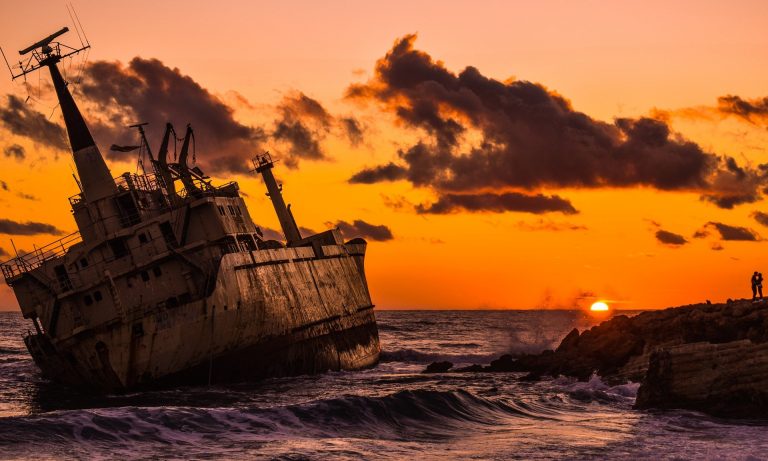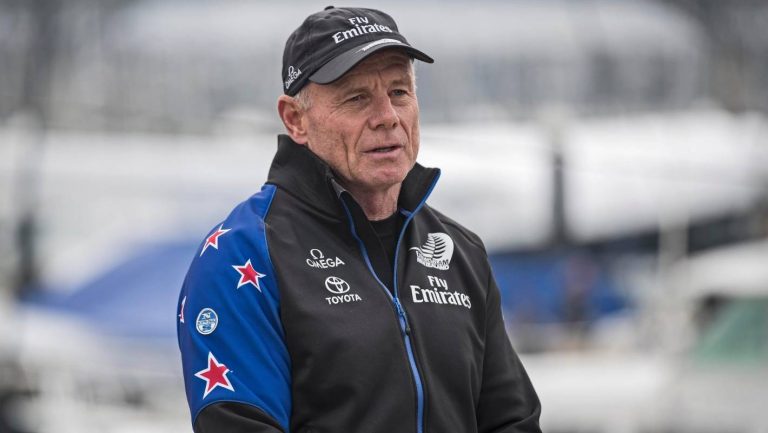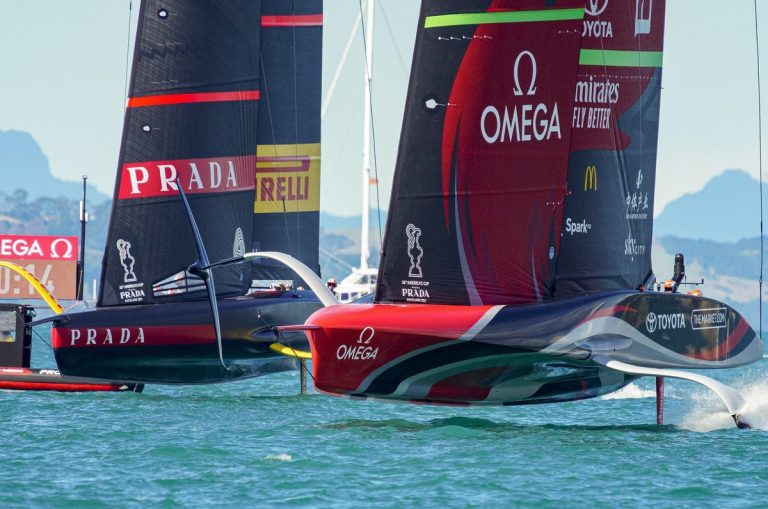“The Americas Cup remains New Zealand’s Cup!”
The words of famous yachting commentator Murray Walker as he presented the oldest trophy in international sport to the victorious Emirates Team New Zealand.
How companies can tack, jibe, and accelerate out of a pandemic
It was an early rise on Wednesday 17th March 2022 to watch Emirates Team New Zealand retain the Auld Mug. Jubilant skipper Peter Burling lifted the magnificent trophy, the champagne sprayed everywhere, and a nation celebrated.
The interviews that followed with CEO Grant Dalton reminded me of how important leadership is right now. His drive and determination took a sinking NZ syndicate in 2003 to success in 2017 and in the face of Covid, triumphed in 2021.
A year into the pandemic, most of us here in the Northern Hemisphere have had Covid knock the wind out of our sails. As I write this, here in the UK we are in our third lockdown – one week before the first anniversary of the first lockdown. Business confidence is low, and against expectations, uncertainty remains. What was once referred to as the new normal is now just normal.
The storm known as Covid-19 has blown almost all businesses off-course. The stop-start-stop nature of the UK and European economies have shipwrecked many businesses small and large. The UK high street is now a graveyard of shipwrecks that include Debenhams, Arcadia Group, and EWM Group.
Too often it seems, the consensus is to learn from mistakes.

Instead of learning from failures, why not look at those who are winning?
The America’s Cup is best described as the Formula 1 of the yachting world. Colossal-like investors pour money in for the prestige reflected from winning the trophy and having the rights to host and set rules for defending the Auld Mug.
The money is not just for show. It provides a major competitive advantage for attracting the best talent and pushing boat design to its engineering limits.
I watched on in amazement how in a sport dominated by billionaires and ground-breaking technology, a bunch of sailors from a small country could achieve so much!
Can a 30-year-old from Tauranga and a bloke from Auckland teach global businesses to not only survive but thrive?
How did those Kiwi’s do it?

Keep it Simple
I was just a young Kiwi kid when I met Grant Dalton in Auckland – the summer of 1994. At the time, his NZ Endeavour Crew was two legs away from winning the Round The World Race. What I remember is even though I was young, his handshake was firm.
In a billion-dollar game, Dalton brings blue-collar values. These values are deeply rooted in a team of dedicated workaholics. Their sacrifice is so great that the cause often comes before family.
It was refreshing for the families to be included in the presentation and celebrations. It was evident that they too were part of that success and they received the recognition they deserved!
To say that Dalton and his team are humble is an understatement. Humility is something you would not often associate with yachting, yet it oozes out of these men and women. When tackling the pandemic, pride can get in the way, often at the price of the business. Maybe a little humility and taking accountability is the first step to navigating through this pandemic?
Data Not Money
In a ruthless sport where the dollar is king, Dalton proved that data could prevail over the dollar. His humble background meant data would lead the dollar.
The team tacked early in preparing for the 2021 defence and opted to invest in machine learning and artificial intelligence. This foresight proved to be the game-changer.
As the wind changed direction and Covid hit, teams were unable to test, train, or race as rigorously as they hoped.
Fortuitously, the team had developed a bot, which could race and learn in a virtual racing environment. While the sailors and design teams were unable to test, train, and race; the bot was constantly working, sailing laps in the simulator, and exploring different parameters.
Te Rehutai proved to be the fastest boat. A testament to the tireless and innovative work of the boat design team.
A year into the pandemic, the data is there, and the trends are clear. Technology is the way forward. Embrace it now.

Innovation Requires Courage From The Top and Buy-in From The Team.
“Certainly, we are a sports team, but 100% with technology and innovation at our core. So when you think about it, maybe it is not entirely surprising because as an organisation if we don’t lead the wave of innovation and technology we simply will not win the sport event on the water. It is as simple as that.” – Grant Dalton
Emirates Team New Zealand has been ranked at #3 on the Global Power List by the STA Group and the English Institute of Sport. Within their report they note that:
“Sailing continues to be a force in this sector, most notably via SailGP and Emirates Team New Zealand. Innovations such as onboard telemetry, video streams, and graphical overlays in race footage and live fusion of boat and biometric data make the sport safer and faster.
…
With a pedigree in the use of simulators, these platforms have driven Emirates Team New Zealand’s hardware, software, firmware, and tactical decisions and will do so as the 2020 America’s Cup World Series approaches.
As if this wasn’t impressive enough, all this, of course, takes place on water.”
Innovation flourishes in an open environment conducive to creativity.
Creative ideas should come from team members of all levels (not just the top). Each member of the team should feel that their input is valued regardless of how big or small it may seem.
A persuasive leader is needed to demonstrate the benefits of making such innovative decisions. With the backing of data analysis and critical thinking, the team can foster the courage needed to collectively implement innovative ideas.
Having strong leadership and a high-performance culture will ensure buy-in is swift.
Bring a Tactician Onboard
Listening to the Tactician whilst racing was fascinating. It is astounding how accurately they can read and forecast changes to weather patterns. It is their predictions, which the Skippers use to make their decisions.
Too often leadership and management are used interchangeably. They are 2 vastly different things. Managers look after day-to-day activities, whilst leaders look to the future.
As a leader, if you are focused on managing day-to-day during the pandemic, you are simply putting out fires. If the boat is sinking, you are merely baling water overboard instead of focusing on the source of the leak.
Bring your Tactician on board to assess the environment and ascertain the risk of taking different directions. Use data and trends as you look to the horizon, otherwise, you may tack into dirty air.
Build a Resilient Team
Dalton is never afraid of making tough decisions. Following the fallout of 2013, a clear-out of crew and personnel was swift and ruthless.
From there he laid down the foundations for the success that has since followed. The crew of 11 superheroes onboard have been developed over the past 4 years and now look to have nerves of steel.
Clear thinking and staying cool under extreme pressure is their trademark.
When they are ‘under the pump’ and having to perform under extreme pressure, whom do they look to? Their colleagues right next to them and their skipper.
“We will keep fighting and trying to win” – Peter Burling
Maybe you don’t need to have a complete team clear out, but what’s certain is that you must manage the mental health of your team. Some will be suffering and as a result, will not have the clear thinking needed to perform under these difficult conditions.
When was the last time you asked each of your employees how they are honestly coping?
You may experience some large swells and as a leader, it’s your responsibility to keep the team together and motivated to drive them through the swells of uncertainty.
If you fail, LEARN FAST!
It was 3-3 in the final and Luna Rossa were keeping up better than what many had anticipated. Perter and his team knew they were in a battle and had to learn and learn fast!
“It is a very tight event, where we are learning a lot all the time. So it really is about going out and executing what we know.” – Peter Burley
Inevitably something might go wrong. That is OK. Be accountable, learn faster, and be decisive.

What can a 30 year old from Tauranga and bloke from Auckand teach us? Turns out quite a lot.
Described as the All Blacks of the sailing world, Emirates Team New Zealand has shown the world how strong leadership, innovation, and togetherness triumphs over billion-dollar investment, politics, and a pandemic.
Innovation is a team sport. Build a culture that fosters creativity. Use analysis and critical thinking to assess the risks and have the courage if you must change direction.
Have the humility to be accountable. Pride has no place in a middle of a storm. Mistakes are going to happen. Learn from them, but learn quick, because there is another storm on the horizon.
Understand the difference between leading through a crisis and managing a crisis. As a leader, take a step back and look at the horizon. Discuss the environment with your Tactician and have the courage to change direction.
Companies need a good skipper at the helm. One who can bring a team together to tack, jibe, and accelerate at pace as one.
We celebrate the obvious successes; however, sometimes the team below deck are the un-song heroes. Listen to their ideas, concerns, and embrace them as part of the team.
It is said that you learn the most when you fail. Maybe its time to see what those who succeed are doing and learn from their wins.
The skipper of the defeated Luna Rossa put it best. “We brought a knife to a gunfight.” When taking on Covid, pull out the big guns, go hard, and go fast.
“Once again Emirates Team New Zealand show the world that kiwis can fly!”
Godspeed,
Dave Crumby
Founder
Sheffield Talent Solutions




